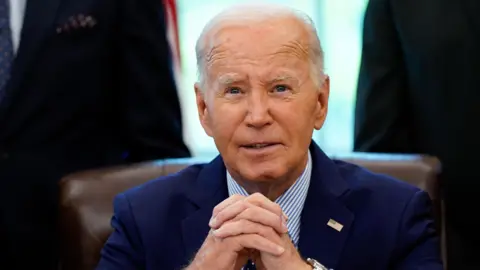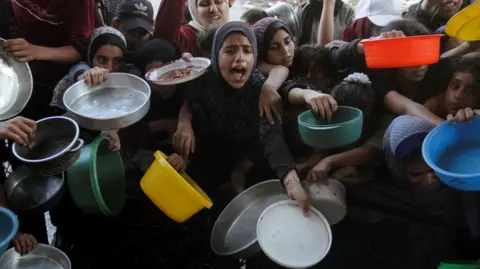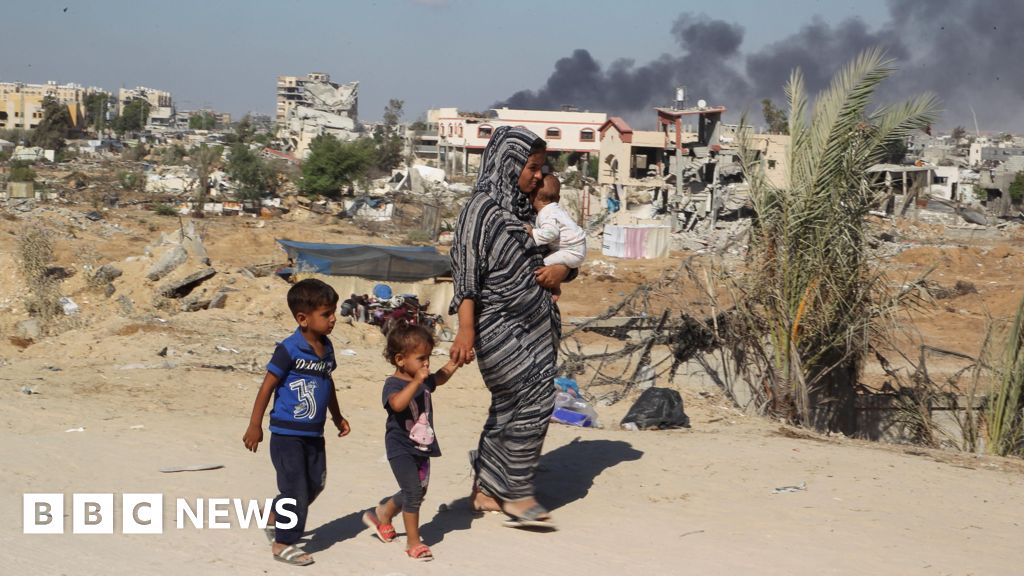 Reuters
ReutersJoe Biden said he was “optimistic” that a ceasefire in Gaza could be reached.
“We are closer than ever”, the US president said after the latest round of talks, adding that he would send his secretary of state to Israel to continue his “tremendous efforts to reach this agreement.”
Amid concerns that Iran could launch an attack on Israel over the assassination of Hamas leader Ismail Haniyeh in Tehran, Biden said “no one in the region should take action to undermine this process”.
Hamas has expressed doubts about the possibility of a deal. Israel did not mention the possibility of a ceasefire but said it “appreciated the efforts of the United States and mediators to dissuade Hamas from rejecting an agreement to release the hostages”.
On October 7, an unprecedented attack occurred in southern Israel, killing about 1,200 people and taking 251 people hostage. The Israeli military launched an operation to destroy Hamas in Gaza.
Since then, more than 40,000 people have been killed in Gaza, according to the Hamas-run Gaza Health Ministry.
The ceasefire agreement reached in November saw Hamas release 105 hostages in exchange for a week-long truce and the release of some 240 Palestinian prisoners in Israeli jails. Israel says 111 hostages are still being held, 39 of whom are presumed dead.
In a recent joint statement, the United States, Qatar and Egypt said they had put forward a proposal for a ceasefire and hostage release deal to “narrow” the differences between Israel and Hamas.
Israel says any ceasefire would require the release of the remaining hostages taken to Gaza by militants during the October 7 attack on Israel. Some of the 251 hostages have since been released, while others are believed to have died in Gaza.
Relatives of the hostages still in Gaza say the ongoing negotiations are the “last chance” for some of them to survive.
After 10 months of war and thousands of casualties, the pressure for a breakthrough was enormous.
If negotiations between Israel and Hamas completely break down, a wider regional conflict is likely to break out, something all parties involved fear.
Mediators said the two-day ceasefire The discussion was “serious, constructive and conducted in a positive atmosphere”.
Technical teams are expected to continue working on the details of how to implement the proposed provisions in the coming days, before senior government officials meet again in Cairo in the hope of reaching agreement on the terms set out in Doha.
While the mediators’ statement is clearly a positive development, a ceasefire agreement is still a long way off.
This isn’t the first time Biden has said he thinks a deal is close, and not everyone shares his cautious optimism.
The response from both Hamas and the Israeli government was less optimistic.
A senior Hamas official told the BBC that Israel had actually changed some of its demands for free movement of people in Gaza under a ceasefire and for Israel to retain military control over key areas of Gaza.
Israel said its position and core principles remained unchanged and were “well known”. It accuses Hamas of refusing to agree to a deal to release the hostages.
Above all, Israelis want to see the remaining hostages released, but many doubt Prime Minister Benjamin Netanyahu’s primary goal. He insisted that a “complete defeat” of Hamas was his government’s top priority.
Meanwhile, Hamas’s new leader, Yaya Sinwar, still shows no sign of compromise.
 Reuters
ReutersA senior Hamas figure – who was not involved in the talks but is in contact with Qatari and Egyptian officials – told the BBC that the Doha talks had not resulted in “the implementation of the commitments agreed during the July talks”.
It is understood that during those talks, Hamas abandoned its demand for a permanent ceasefire and instead supported Biden’s proposal for a six-week pause to broker an end to the war.
Biden’s ceasefire proposal also includes the withdrawal of Israeli troops from all populated areas of Gaza, the phased release of hostages in exchange for Palestinian prisoners and the return of the remains of dead hostages.
However, Hamas accused Israel of proposing new conditions a week later, but it is understood that Hamas is still willing to revisit the previous version of the agreement.
The “transition proposal” put forward by US, Egyptian and Qatari negotiators will be the subject of US Secretary of State Antony Blinken’s negotiations in the region and should form the basis of the next Cairo talks, where all parties, including Hamas, are expected to All will be present to participate.
The proposal reportedly “bridges the remaining differences between the parties’ positions” so that the agreement can be “quickly implemented.”
This may sound simple, but there are still significant hurdles to overcome, and there remains total distrust among senior Israeli or Hamas figures.
They are dragged to the negotiating table by others—perhaps against their will—because they fear what will happen if they fail.
Meanwhile, Israeli military operations in Gaza continue, with an airstrike early Saturday morning killing 15 people in the Zawaida area of central Gaza, according to the Palestinian Civil Defense relief agency.
Nine children and three women were among the dead, spokesman Mahmoud Basal told AFP.
Israel has not commented directly. The Israel Defense Forces said on Saturday morning it had “neutralized a number of terrorists” in central Gaza, including one who fired at Israeli forces operating in the area.
The Israeli military issued new evacuation orders for several neighborhoods north of Khan Younis and Deir Bala, further shrinking the humanitarian area where thousands of displaced Palestinians have taken refuge from the fighting.
Israel says the neighborhoods pose a danger to civilians “due to significant acts of terrorism” and the firing of rockets and mortars into Israel.
“Fear is spreading again as families have nowhere to go,” the United Nations agency for Palestinian refugees (Unrwa) said.
Adding to the urgent need for a ceasefire is the spread of the polio virus, which can be transmitted through feces, currently spreading within Israel’s designated humanitarian zone in Gaza.
“Let us be clear: the ultimate vaccine for polio is a peaceful and immediate humanitarian ceasefire,” said U.N. Secretary-General Antonio Guterres.


